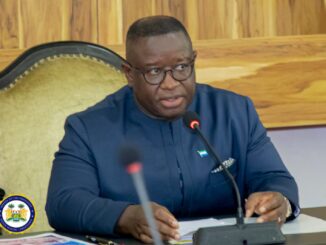
Kudos to the Opposition for Keeping the Party in Power Accountable
A Commentary By Ranger
In succeeding to get the ruling SLPP party to do the right thing to bring the statutory instrument for the mid-term census to Parliament for debate and approval or rejection is an achievement that the nation should warmly applaud the opposition, led by the APC, for.In a multiparty system of Government, the existence of a healthy, respected and respectful opposition is what ensures that the ruling party does not overstep the bounds of constitutional rule.

As such, for a democracy to function properly, it needs an opposition to provide political contestation and electoral competition, thus limiting the power of the ruling party. In other words: no opposition – no democracy.
We saw in Africa in the 1960s and 1970s that without a vibrant opposition, the tendency for the State to become authoritarian and to engage in political repression becomes highly probable.Opposition parties must not be restricted from expressing their freedom of expression.
They must be heard or else what we will have is a one party system where one political party forms and runs the Government. This may happen in two ways. Firstly, the activities of the opposition may be completely outlawed such that even the opposition leaders are not allowed to participate in discussions on things that the party in power does, or even take part in elections.
We saw that during the one-party days in Sierra Leone.Secondly, the chances of the opposition to clinch power can be thwarted by the unfavorable legal framework deliberately put in place to frustrate their participation in politics.One party State could operate in an authoritarian context or even in some cases in multiparty framework set up.
Notably, in some cases a dominant political party that is in power only allows other less dominant parties that are allied to it to exist, while completely outlawing the opposition parties. In order to determine whether a particular political framework is good or bad for governance one needs to first of all determine the criteria for such.
There are three important factors that determine such and they include; political stability, economic development and nation building. What matters in safeguarding democratic pluralism is the legal framework in place and other social, economic and political factors that underpin the country’s political culture.
But most importantly there is the need to allow a high level of freedom and healthy political competition in order for the Government to self -check and correct itself where the opposition says it is going wrong.At the end of the day it all boils down to the essence of participatory governance which is all about the structures and processes designed to ensure accountability, transparency, rule of law, equity, inclusiveness, empowerment and broad based participation.
On the other hand, once opposition is stifled, the State easily degenerates into authoritarianism and thus becoming a hindrance to economic development. The party in power becomes the hub of corruption. Disregard for merit and reward of loyalty for even those that are unfit to hold public office becomes rife; thereby undermining dangerously the essence of democratic rule which means Government of the people, by the people and for the people. So said, nation building cannot be achieved where the freedom of members of the Legislature, interest groups, local authorities and other avenues of popular participation, the media and the bureaucracy is curtailed.
At the broader societal level, it becomes the duty of the political parties in fostering nation building and national unity to preach constantly to their members and supports the values of peace, love and unity; as the importance of values cannot be undermined when it comes to good governance.
It is the software through which Management of public affairs are managed. Having common values as a nation is what provides the moral fiber to demand accountability, transparency and responsiveness especially on the party in power.In conclusion, good governance boils down to the question of what is the essence of governance.
What are the expectations of the citizenry? Does whatever political framework in place committed to performance of the social contract as espoused by political scientist Thomas Hobbes? Are the party leaders committed to genuinely, diligently serving the people fairly without discrimination as to tribe, region or political party?



